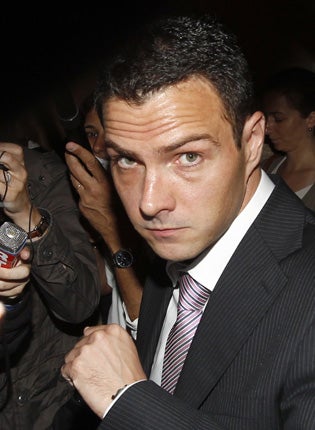Rogue trader blames the bank for €5bn loss
Jérôme Kerviel turns tables on his former employer as his case enters its final week

Your support helps us to tell the story
From reproductive rights to climate change to Big Tech, The Independent is on the ground when the story is developing. Whether it's investigating the financials of Elon Musk's pro-Trump PAC or producing our latest documentary, 'The A Word', which shines a light on the American women fighting for reproductive rights, we know how important it is to parse out the facts from the messaging.
At such a critical moment in US history, we need reporters on the ground. Your donation allows us to keep sending journalists to speak to both sides of the story.
The Independent is trusted by Americans across the entire political spectrum. And unlike many other quality news outlets, we choose not to lock Americans out of our reporting and analysis with paywalls. We believe quality journalism should be available to everyone, paid for by those who can afford it.
Your support makes all the difference.As the final week of France's financial trial of the century opens today, the running score appears to favour the five-billion-euro man, Jérôme Kerviel.
Mr Kerviel, 33, accused of losing €4.9bn (£4bn) on unauthorised trades in 2007-08, has often been in difficulties in the last two weeks. He has admitted faking emails and computer records to cover up his multi-billion euro trades on share futures. He has struggled to explain why he took such trouble to conceal positions that he insists were tacitly approved by his bosses.
He admitted, at one point, that he had invented a rugby-mad British client called "Matt" to explain his huge, initially successful, bets on the downward movement of the European share market in 2007. Mr Kerviel, confident to the point of arrogance, has sometimes appeared to be is own worst enemy. He has suggested on several occasions that the court is unable to grasp the complexity, and baffling lexicon, of financial trading.
"Why don't you understand?" Mr Kerviel began one of his replies to the presiding judge, Dominique Pauthe. Cutting him short, Mr Pauthe said: "Are you asking the questions now?"
On the other hand, the real defendant in the trial has often seemed to be not Mr Kerviel, but his bank, Société Générale. Mr Kerviel's principal lawyer, Olivier Metzner, has produced a string of witnesses and exhibits to suggest that France's second biggest bank let speculation thrive in the run-up to the subprime crash of 2008.
Bank records produced last week showed that Mr Kerviel's internal bank "treasury" was sometimes billions of euros over his official trading limit. "None of my superiors asked questions," the young man told the court. "They could see exactly what was in the treasury of each trader."
A series of witnesses still employed by the bank, including Mr Kerviel's immediate bosses, have testified that there were fixed limits on risks at SocGen. By taking uncovered positions of up to €50bn, the young trader had acted with "criminal" irresponsibility, they said.
They also testified that it was impossible to know the nature, and extent, of the speculative trades made by Mr Kerviel. These assertions were undermined by the testimony of Mr Kerviel's former assistant, Taoufik Zizi, who was fired by SocGen for "professional incompetence" several months after the scandal broke.
"We could see Jerome Kerviel making trades on his machine. It was impossible not to see what he was doing," said Mr Zizi, 25, "It was obvious that Kerviel was taking huge positions on futures. I think the hierarchy knew that he was making directional bets", in effect, risking huge sums on the ups and downs of the market, rather than covering his positions as he was supposed to.
Even the profit officially declared by Mr Kerviel at the end of 2007 – €55m – was much too large to come from his normal trading on "turbowarrants", Mr Zizi said. It had to have come from "spiels" or speculative trades.
Mr Kerviel's real profit in 2007 was a staggering €1.5bn, which he disguised and carried over into 2008.
The chief defence lawyer, Mr Metzner, asked Mr Zizi about his dismissal from SocGen in 2008. Could it have been linked to the fact that he had informed investigators that SocGen bosses knew that Kerviel was taking enormous risks? "I think there was a connection," the young man said.
A professor of finance and an expert in trading culture, Catherine Lubochinsky, told the court this week that "excesses of confidence" and rule-breaking were part of the "psychology" of trading floors, which attracted people with "higher than usual levels of testosterone".
Who is guilty, the presiding judge asked, Mr Kerviel or the bank? Professor Lubochinsky replied: "They all are."
The final days of the trial will examine SocGen's hurried unwinding of Mr Kerviel's positions in January 2008. The court will also hear the testimony of SocGen's former president, Daniel Bouton, who was forced to step down after the Kerviel scandal. The defence plans to accuse him of creating a "profit crazy" mentality at the bank. Daniel Richard, another Kerviel defence lawyer, asked: "Without Bouton, would there have been a Kerviel?"
Jerome Kerviel is charged with abuse of trust and falsifying documents and computer records. He faces up to five years in jail. The trial is expected to conclude this week but judgement will probably be delayed.
Join our commenting forum
Join thought-provoking conversations, follow other Independent readers and see their replies
Comments